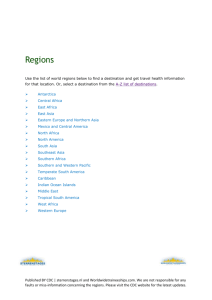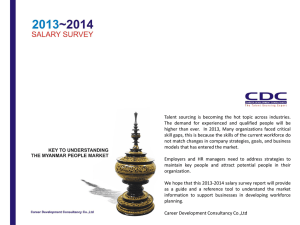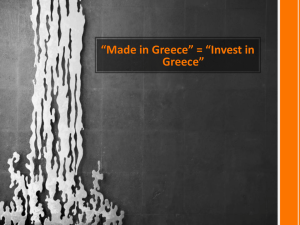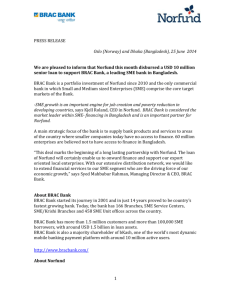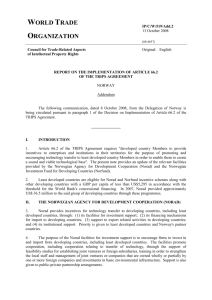Aureos - Association of CDC Pensioners
advertisement
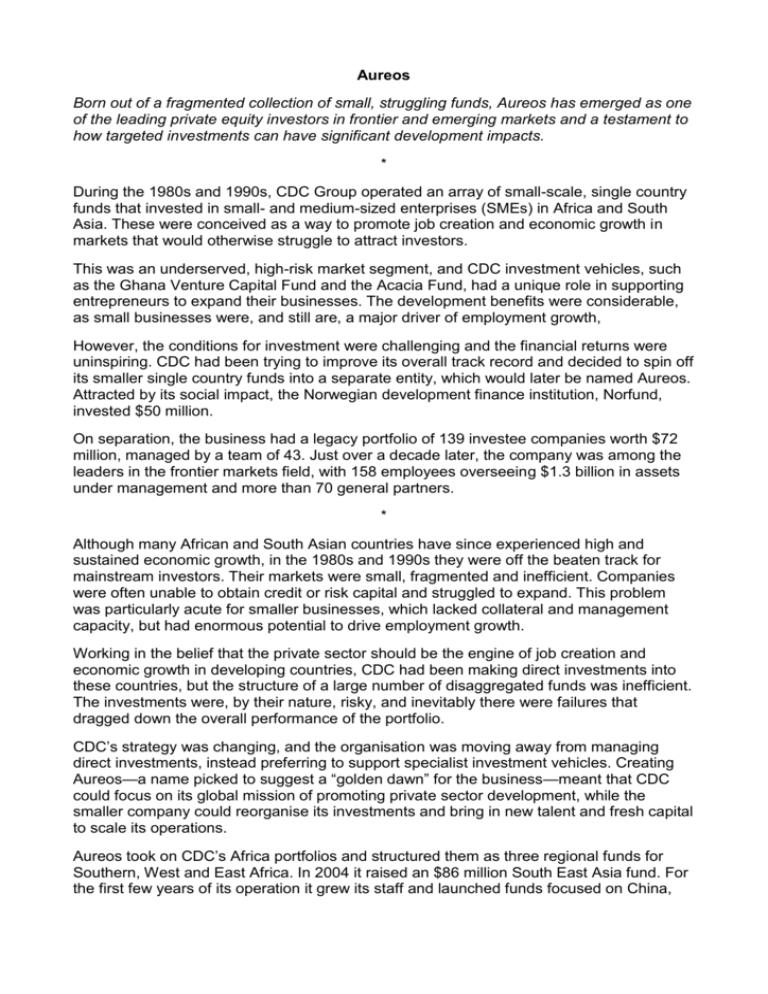
Aureos Born out of a fragmented collection of small, struggling funds, Aureos has emerged as one of the leading private equity investors in frontier and emerging markets and a testament to how targeted investments can have significant development impacts. * During the 1980s and 1990s, CDC Group operated an array of small-scale, single country funds that invested in small- and medium-sized enterprises (SMEs) in Africa and South Asia. These were conceived as a way to promote job creation and economic growth in markets that would otherwise struggle to attract investors. This was an underserved, high-risk market segment, and CDC investment vehicles, such as the Ghana Venture Capital Fund and the Acacia Fund, had a unique role in supporting entrepreneurs to expand their businesses. The development benefits were considerable, as small businesses were, and still are, a major driver of employment growth, However, the conditions for investment were challenging and the financial returns were uninspiring. CDC had been trying to improve its overall track record and decided to spin off its smaller single country funds into a separate entity, which would later be named Aureos. Attracted by its social impact, the Norwegian development finance institution, Norfund, invested $50 million. On separation, the business had a legacy portfolio of 139 investee companies worth $72 million, managed by a team of 43. Just over a decade later, the company was among the leaders in the frontier markets field, with 158 employees overseeing $1.3 billion in assets under management and more than 70 general partners. * Although many African and South Asian countries have since experienced high and sustained economic growth, in the 1980s and 1990s they were off the beaten track for mainstream investors. Their markets were small, fragmented and inefficient. Companies were often unable to obtain credit or risk capital and struggled to expand. This problem was particularly acute for smaller businesses, which lacked collateral and management capacity, but had enormous potential to drive employment growth. Working in the belief that the private sector should be the engine of job creation and economic growth in developing countries, CDC had been making direct investments into these countries, but the structure of a large number of disaggregated funds was inefficient. The investments were, by their nature, risky, and inevitably there were failures that dragged down the overall performance of the portfolio. CDC’s strategy was changing, and the organisation was moving away from managing direct investments, instead preferring to support specialist investment vehicles. Creating Aureos—a name picked to suggest a “golden dawn” for the business—meant that CDC could focus on its global mission of promoting private sector development, while the smaller company could reorganise its investments and bring in new talent and fresh capital to scale its operations. Aureos took on CDC’s Africa portfolios and structured them as three regional funds for Southern, West and East Africa. In 2004 it raised an $86 million South East Asia fund. For the first few years of its operation it grew its staff and launched funds focused on China, Central America, the Pacific Islands and Malaysia, all the while selling down its legacy portfolio. In 2008, the company’s Sri Lankan CEO Sev Vettivetpillai led a 100 per cent management buyout, taking Aureos Capital entirely private for the first time. However, its success in delivering social impact meant that major development financiers, including Norfund and the International Finance Corporation of the World Bank, continued to invest in its funds. * At the centre of Aureos’ success has been its dedication to putting environmental, social and governance metrics at the heart of its process, trying to balance the development impact of investments with the financial returns. From due diligence through to monitoring and reporting, the firm’s employees use international best practice to ensure that their capital grows businesses, strengthens economies and shares social benefits throughout societies. The company has also worked to tackle major global challenges through innovative financial and business initiatives. Working with Norfund and the IFC, Aureos created the SME Sustainable Opportunities Initiative, which offers concessionary loans and grants to companies in developing markets to improve their social and environmental footprint. This facility has been used to improve energy efficiency and reduce carbon emissions, contributing to developing countries’ efforts to mitigate man-made climate change. In 2007, Aureos undertook a survey of its portfolio companies in sub-Saharan Africa to understand how they were managing the impact of HIV/AIDs, malaria and tuberculosis on employees and their families. The firm then reviewed its supply chains, to determine how the distribution networks within the Aureos portfolio could be leveraged to bring healthcare goods and services to vulnerable populations in remote areas or high-density urban environments. The research identified 14 companies engaged in best practice, 150 healthcare providers and six individual supply chains, which could be used to deliver condoms, malaria nets and over-the-counter drugs throughout East Africa. The programme now reaches more than seven million people each week. In response to the huge need for improved healthcare systems in the developing world, Aureos raised the Africa Health Fund in 2009. The $60 million vehicle began with an investment in the Nairobi Women’s Hospital in the Kenyan capital. The firm has also participated in expanding and developing the management capacity of entrepreneurs in its target markets, in the belief that better management builds better businesses. With support from the Indian government and Norfund, and in partnership with a group of leading Indian business schools, Aureos has created a programme to provide training for employees in its portfolio companies. More than 150 managers from around the world have now attended the courses, which focus on raising operational efficiency and improving governance. Working with SMEs in emerging markets is a complex, high-touch process that requires a serious commitment. Aureos has sponsored and established 14 new SME funds, building an office network of 25 offices in Latin America, Africa and Asia. The firm provided a compelling proof of the concept that well-designed, socially-sensitive investments in entrepreneurs and family businesses can deliver meaningful development benefits alongside impressive financial returns. In 2012, with more than $1.3 billion in assets under management and a wide range of institutional and private investors, Aureos was acquired by the emerging markets private equity manager, Abraaj Capital, creating one of the world’s largest specialist investors in growth markets.

